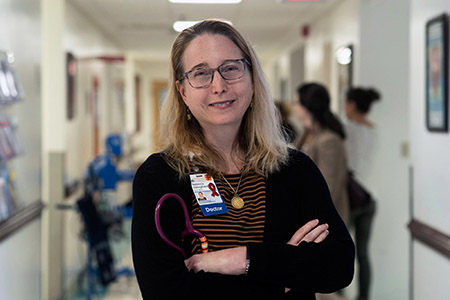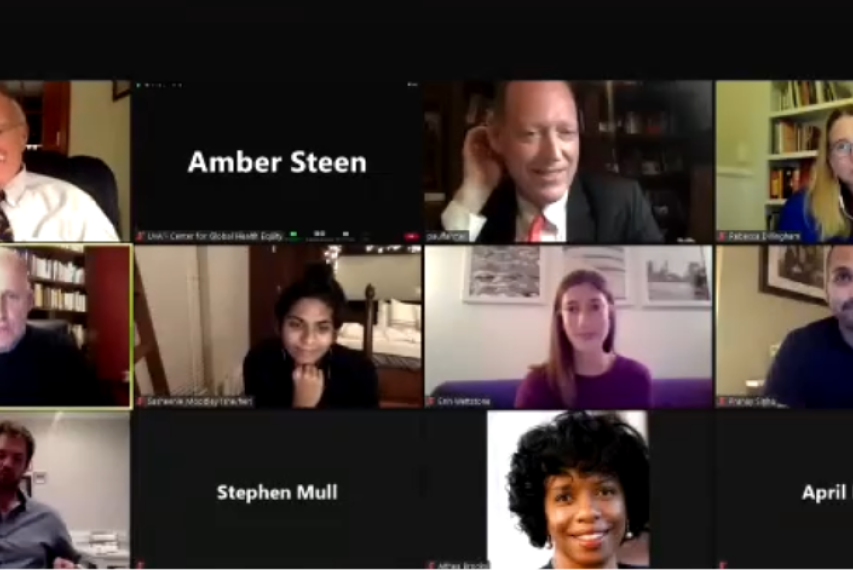On November 9, more than 800 participants came together virtually for the Annual Global Health Scholar Research Symposium organized by Center for Global Health and to listen to renowned American medical anthropologist and physician Paul Farmer. Farmer’s conversation was celebrating CGH’s founding director Richard Guerrant’s more than four decades of tireless work in addressing health disparities in the US and around the world.
As the Center reflected on how much of its work over the last four decades has strived to address healthcare disparities, a decision was taken to rename the Center to describe more accurately its purpose: Center for Global Health Equity (CGHE). The conversations set the tone for the evening as the participants discussed the importance of the pursuit of global health equity with special reference to the roles that students and universities can play.
As Vice Provost for Global Affairs, Steve Mull opened the Symposium, he recognized the importance of the name change. “With the word equity, we bring to life the truth that progress in health is not just about scientific progress; it is also about bringing the fruits of that progress to all of humankind,” he said.
Dr. Rebecca Dillingham, Director of CGH stressed the importance of recognizing the work and accomplishments of the 2020 University Scholars who faced unprecedented challenges in the context of the COVID-19 pandemic. Typically, the CGH University Scholars conduct faculty-mentored research and community engagement projects with partners around the world. However, this year, only virtual projects were possible, and yet 26 students with 14 faculty mentors made them happen with partners in Rwanda, Nepal, Nicaragua, and Southwest VA.
“The scholars represent the foundation and the future of CGHE; as they seek to enact the values of parity, reciprocity, and essential respect critical to global engagement, they take all of us forward into what is possible,” said April Ballard, Associate Director for Student Programs.
We caught up with Rebecca Dillingham on the name change for the center.

Why is “equity” in the name important and how does it signify the mission of the center?
Dillingham: Since its founding in 2001, the Center for Global Health (CGH) has sought to “address the diseases of poverty.” That was, in fact, our tagline. Today, we continue to prioritize projects that focus on conditions and diseases that exact a disproportionate toll from the poor.
However, as we have thought critically about the activities that we support, we know that the students and faculty working with CGH are often striving to diminish the upstream forces that result in people living in poverty in communities in Virginia and around the world. CGHE scholars and affiliated faculty are also considering and engaging with societal factors beyond ‘poverty’ that contribute to ill health.
Therefore, to make explicit our commitment is not only to seek to improve the care of those suffering from the diseases of poverty but also to engage with the work of ending global health disparities. We are proud to announce our new name, the UVA Center for Global Health Equity.
Specific activities to promote equity can and will include supporting proposals that serve the most vulnerable, a concept frequently referenced in Dr. Farmer’s work, the “preferential option for the poor.”
In addition, working for equity requires designing and implementing actions at a variety of levels that dismantle structural barriers to health and well-being such as unequal access to quality education, a healthy environment, nutritious food, comprehensive medical and mental health care, and others. Thirdly, in the pursuit of equity, we cannot forget the noxious effects of racism and colonization, of the stigmatization of sexual and gender minorities, and of failures to include the perspectives of people with disabilities. Advocacy with and for marginalized populations is essential and will remain a part of our work.
Would the name change have an impact on the work of the center? What are some of the projects the center is working on?
Dillingham: While the COVID-19 pandemic has slowed or changed some activities, it has also reinforced how important engagement with the science and practice of global health equity is! At the Center for Global Health Equity, we look forward to continuing to grow the community of global health equity scholarship and practice at UVA and with our partners around the globe. As noted above, we will continue to seek faculty-mentored student projects that engage with communities that suffer disproportionate burdens of ill health. Faculty from any school at UVA as well as from UVA’s College at Wise and from our partner institutions are welcome to propose projects. We will also be launching the new Nancy and Richard Guerrant Professor Award for Global Health Equity. This is an effort to expand the number of faculty who include global health equity work in their academic “on-time” and who support student participation in that work. Applications will become available for this award in the winter of 2020-21.
Another critical component of equity is ensuring that the global health equity workforce is diverse and inclusive. We have previously had support from the National Institutes of Health to provide global health research training to students from communities that have been traditionally under-represented in the health sciences. We will be working with organizations across Grounds and with donors to continue and expand this program.
Thirdly, our associate director for student programs, April Ballard, has led efforts to expand CGHE’s engagement with the Charlottesville community through the city and county schools as well as with initiatives supported by the Virginia Department of Health to expand access to testing for blood-borne pathogens. Over the past two years, these efforts have been embraced by CGHE’s outstanding student advisory board. We look forward to identifying more ways to connect meaningfully and respectfully with the Charlottesville and Albemarle communities in the time of COVID-19 and beyond. There are so many efforts through the Equity Center and the Vice Provost for Academic Outreach’s office, and we are eager to support and partner, where appropriate.




